|
|
|
Sort Order |
|
|
|
Items / Page
|
|
|
|
|
|
|
| Srl | Item |
| 1 |
ID:
095049
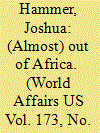

|
|
|
| 2 |
ID:
173831
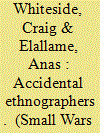

|
|
|
|
|
| Summary/Abstract |
The disillusionment with U.S.-led counter insurgent efforts to gain a deeper understanding of social dynamics in countries with extensive tribal structures has led to a rejection of programs aimed to improve cultural competency. The Islamic State movement does not share this perception, and its strategists blamed its early failures during the U.S. occupation on a flawed understanding of tribal dynamics. This paper traces the political, ideological, and structural changes the leaders of the Islamic State movement made to adapt its approach toward the Sunni tribes of Iraq and later Syria, in order to develop a deeper base of popular support for its caliphate project. The group’s study of the tribes was done by a new tribal engagement office that put into motion an ethnographic study of tribal networks in key areas. There is evidence that the inspiration for this change came from its opponents. The Islamic State movement used these new insights to win a greater level of influence in rural areas, which in turn influenced its success in 2014. This research supports the idea that insurgency and counterinsurgency success often depend on which side is best at the incorporation of cultural and societal knowledge into policy and strategy.
|
|
|
|
|
|
|
|
|
|
|
|
|
|
|
|
| 3 |
ID:
152024


|
|
|
|
|
| Summary/Abstract |
This essay analyzes the link between mobilization and tribalism that developed in the Anbar Awakening. The Anbar Awakening exposed the Anbari tribal structure as a deeply entrenched and complex network deployed to mobilize support and generate behavior that would achieve the most advantageous strategy and position in a fight against al-Qaeda. Although this description supports David Kilcullen’s tribal society model, the rules of the Awakening movement that restored the tribal network were hardly explored by counter-insurgents for value and opportunity. The essay therefore draws on narratives from Anbari sheikhs to analyze the properties of tribalism (culture, identity, and problem-solving) as a non-linear social network, and demonstrates a paradigm in which mobilization of Anbari tribesmen is a valid indicator of security. The link between mobilization and tribalism in the Anbar Awakening therefore strategically develops to intervene in social life and address security locally.
|
|
|
|
|
|
|
|
|
|
|
|
|
|
|
|
| 4 |
ID:
117602
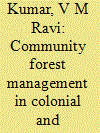

|
|
|
|
|
| Publication |
2012.
|
| Summary/Abstract |
In the past two decades, South Asia has undergone robust reforms in the forestry sector which claim to be initiating a transformation from state-centric to people-centric forest management. This shift is perceived as an important move towards decolonisation in governance processes in India. Examining the forest policies in colonial and postcolonial South India, this article finds, however, that community forest management in postcolonial India remains substantially rooted in the colonial framework of forest resource management policies. In practice, this means that exploitation of forests gives some consideration to the requirements of forest-dependent communities today, but does so now under the control of a state that fails to protect the most basic rights of many of its most vulnerable citizens. The article thus argues critically that supposedly people-centric community forest management in India is not sensitive enough to local development needs, nor indeed sufficiently protective of the basic needs of many forest-dependent people.
|
|
|
|
|
|
|
|
|
|
|
|
|
|
|
|
| 5 |
ID:
101244
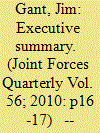

|
|
|
| 6 |
ID:
149489
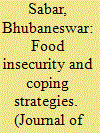

|
|
|
|
|
| Summary/Abstract |
This paper explores the food insecurity level and coping strategies of two particularly vulnerable tribal groups (PVTGs) in India. It finds that despite the availability of resources, limited income always becomes a proxy for their food vulnerability because they cannot purchase food items outside state programmes. These groups traditionally adopt various coping strategies to overcome food insecurity at household level and these have become a structure and behaviour for ensuring food security
|
|
|
|
|
|
|
|
|
|
|
|
|
|
|
|
| 7 |
ID:
154984


|
|
|
| 8 |
ID:
158467
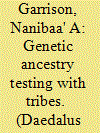

|
|
|
|
|
| Summary/Abstract |
Genetic ancestry tests have gained in popularity across the United States as more Americans seek answers about their ancestral past. The tests have been used to verify or dispute family stories about ancestors or to allow people to seek a sense of belonging with a particular tribe or community. They can also be useful in medical research to identify genetic variants across populations. At the same time, assumptions about genetic testing – and the very idea of a “genetic” identity – pose challenges for communities that are defined in terms of political, social, and cultural identities. This essay explores a range of uses of ancestry tests and their potential implications for Native American tribes and communities. It concludes that the scientific and recreational use of genetic ancestry testing continues to increase over time, but limitations of the consistency of results across platforms and the generalizability of knowledge remain.
|
|
|
|
|
|
|
|
|
|
|
|
|
|
|
|
| 9 |
ID:
124155


|
|
|
|
|
| Publication |
2013.
|
| Summary/Abstract |
This article focuses on the emergence and evolution of the Afghan Local Police (ALP), a pro-government militia supported by the US military in Wardak Province. The ALP and its previous incarnations have been justified, invoking notions of 'local solutions' and 'cost-effectiveness', as a politically convenient and culturally appropriate measure to supplement broader efforts to counter the insurgency and build up the regular forces. Inspired by the tribal policing concept of arbaki, ALP was envisaged as a short-term local defence force. But the programme has been controversial, and its impact in improving security questionable. In analysing the contestations between different actors involved in the programme, the article demonstrates that the US military's attempt to resuscitate 'age-old traditions' of self-protection proved difficult to realize and produced unforeseen and largely deleterious outcomes. It concludes that far from reflecting the needs of local villagers, ALP was a top-down imposition whose objectives were much narrower than the purported aim of protecting the local population in Wardak.
|
|
|
|
|
|
|
|
|
|
|
|
|
|
|
|
| 10 |
ID:
085806
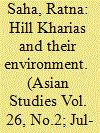

|
|
|
|
|
| Publication |
2008.
|
| Summary/Abstract |
The Hill Kharias are one of the tribes residing in the hilly or forest areas of the Purulia district of West Bengal and Singbhum district of Jharkhand. The Hill Kharias are one of the three sub-divisions of the Kharias, the two others being Dudh Kharias and Dhelki Kharias. The Hill Kharias prefer to confine themselves in the inhospitable hilly and forest areas, and they mostly depend on forest resources such as fruits, honey and edible roots etc. for their livelihood.
|
|
|
|
|
|
|
|
|
|
|
|
|
|
|
|
| 11 |
ID:
163586
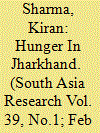

|
|
|
|
|
| Summary/Abstract |
The realities of starvation and hunger in South Asia are only partially addressed by larger discourses on food security. At the local level, many Indians continue to experience hunger, semi-starvation and malnutrition. While the age of mass starvation seems over, starvation deaths are reported from time to time, and hunger remains a lurking threat. This ethnographic study analyses patterns of poverty and food (in)security among tribal and other social groups in seven villages of the Manatu block in Palamu district of Jharkhand. The empirical findings present the main factors influencing the dynamics of household food (in)security and examine, through some case studies, how poor rural/tribal communities cope with threats of starvation and hunger. The article also critically analyses the implementation of social policies in addressing food security in Jharkhand and finds that more needs to be done to assist the most vulnerable individuals, including many women, to escape the precarities of hunger.
|
|
|
|
|
|
|
|
|
|
|
|
|
|
|
|
| 12 |
ID:
157593
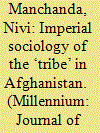

|
|
|
|
|
| Summary/Abstract |
The ‘tribe’ is a notion intimately related to the study of Afghanistan, used as a generic signifier for all things Afghan, it is through this notion that the co-constitution of coloniser and colonised is crystallised and foregrounded in Afghanistan. By tracing the way in which the term ‘tribe’ has been deployed in the Afghan context, the article performs two kinds of intellectual labour. First, by following the evolution of a concept from its use in the early 19th century to the literature on Afghanistan in the 21st century, wherein the ‘tribes’ seem to have acquired a newfound importance, it undertakes a genealogy or intellectual history of the term. The Afghan ‘tribes’ as an object of study, follow an interesting trajectory: initially likened to Scottish clans, they were soon seen as brave and loyal men but fundamentally different from their British interlocutors, to a ‘problem’ that needed to be managed and finally, as indispensable to a long-term ‘Afghan strategy’. And second, it endeavours to describe how that intellectual history is intimately connected to the exigencies of imperialism and the colonial politics of knowledge production.
|
|
|
|
|
|
|
|
|
|
|
|
|
|
|
|
| 13 |
ID:
120924
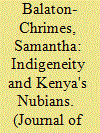

|
|
|
|
|
| Publication |
2013.
|
| Summary/Abstract |
Recent studies of indigeneity in Africa have highlighted the problematic nature of the concept in a continent where it is difficult to determine which groups have temporal priority in a given location. These studies have suggested, with varying degrees of criticism, that indigeneity in Africa is a strategic identity deployed to attain a special status and associated benefits, often to remedy past harms. This article agrees that indigeneity is an act of positioning, but suggests that in the Kenyan context it can be deployed in another way as well, that is, as an act that seeks equal rather than special positioning within the dominant population. In this case indigeneity is not a special 'slot' but rather the norm. The article illustrates this by drawing on research with the Nubian community of Nairobi who seek to shed their ethnic stranger status and instead position themselves as indigenous to Nairobi in order to access the same quality of citizenship as that enjoyed by Kenya's '42 tribes'.
|
|
|
|
|
|
|
|
|
|
|
|
|
|
|
|
| 14 |
ID:
049985
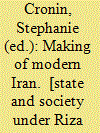

|
|
|
|
|
| Publication |
London, Routledge, 2003.
|
| Description |
xi, 279p.hbk
|
| Series |
RoutledgeCurzon/ BIPS Persian Studies Series
|
| Standard Number |
0415302846
|
|
|
|
|
|
|
|
|
|
|
|
Copies: C:1/I:0,R:0,Q:0
Circulation
| Accession# | Call# | Current Location | Status | Policy | Location |
| 047398 | 955.052/CRO 047398 | Main | On Shelf | General | |
|
|
|
|
| 15 |
ID:
164400
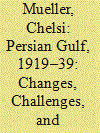

|
|
|
|
|
| Summary/Abstract |
The interwar period (1919–39) was a formative period in the Persian Gulf. These years marked a transition from a Gulf society once characterized by symbiosis and interdependency to a sub-region characterized by national divisions, sectarian suspicions, rivalries and political tension. This period witnessed a surge of anti-colonial and nationalist feeling in Iran, the rise of a stridently nationalist military leader in the person of Reza Shah Pahlavi, his implementation of an assertive Persian Gulf policy and his re-assertion of Iran’s claims to coastal territories ruled by Arab shaykhs under British protection. The challenge posed by ascendant Iran to Britain’s dominant position in the Persian Gulf generated an abrupt shift from indirect to direct forms of colonial penetration in the Gulf Arab shaykhdoms and a transfer of Britain’s locus of power from the Iranian to the Arabian littoral. This article surveys the wide-ranging political, economic and social processes that transformed the Persian Gulf community into a sub-region of Arab-Iranian rivalry during the interwar period.
|
|
|
|
|
|
|
|
|
|
|
|
|
|
|
|
| 16 |
ID:
155117
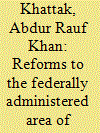

|
|
|
|
|
| Summary/Abstract |
In March 2017, Pakistan formally took the decision to begin a process of incorporating the Federally Administered Tribal Territories into the framework of regular Pakistani law. This article offers an overview of the historical system of governance of the Tribal territories, along with a discussion of the development of the recent reforms and their prospects for success.
|
|
|
|
|
|
|
|
|
|
|
|
|
|
|
|
| 17 |
ID:
174792
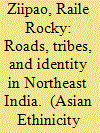

|
|
|
|
|
| Summary/Abstract |
Along with military expeditions and social and anthropological surveys, road-building projects were prominent strategies of the British in India when it came to dealing with tribes and territorialization of the frontier regions. Roads for territorial expansion and resource extraction were the core agenda of the colonial project in Northeast India. The post-colonial Indian state on the other hand built roads in the region for securing the borders, promoting national integration, and linking external markets. This article posits that road building has always been an act of power, which has at different times been aimed at smoothening relationships, securing borders, (dis)connecting people, enabling trade, creating spaces of contestation, or diluting boundaries between varied ethnic groups. The article analyzed the colonial state-making project through road construction and linked to the contemporary Indian state approach to infrastructure development in tribal-dominated areas of Northeast India.
|
|
|
|
|
|
|
|
|
|
|
|
|
|
|
|
| 18 |
ID:
191867
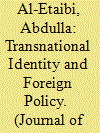

|
|
|
|
|
| Summary/Abstract |
The 2017 Gulf crisis has been largely framed as a diplomatic and economic one. However, the involvement of tribal identity in the foreign policy responses of Gulf states also made it a socio-political crisis. This paper adopts role identity theory as a framework for analysing how domestic politics and culture shaped international relations among GCC states during the crisis. According to this framework, tribal identity becomes operative in foreign policy when states can present themselves as fulfilling roles that distinguish them within a regional or international state system. Gulf states adopted new role identities defined in terms of tribe and tribal identity that then shaped the formulation and implementation of their diplomatic policies. During the crisis, Saudi Arabia adopted the role identity of tribe protector to undermine sovereign boundaries. The Qatari government on the other hand adopted the role of national unifier, rejecting tribal identity and ideologies. The implications of mobilising tribes are examined from the regime survival perspective, particularly scrutinising the gradual consolidation of the Qatari national identity to reduce risks posed to the regime.
|
|
|
|
|
|
|
|
|
|
|
|
|
|
|
|
| 19 |
ID:
188339
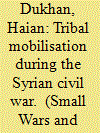

|
|
|
|
|
| Summary/Abstract |
As a result of the debilitating situation that the Syrian state reached during the Syrian Civil War, the government relies heavily on paramilitary groups to confront security challenges. Existing studies imply that all the paramilitary groups in Syria were formed in a largely top-down process. Focusing on the rise of al-Baqqer Brigade in Syria and relying on a series of in-depth interviews with members of the al-Baggara tribe who make up most of this militia, this paper challenges that assumption. The paper shows that the emergence of tribal militias is principally a grassroots phenomenon stemming from competition over local resources. It argues that the Syrian state has seized this opportunity and outsourced some of its security and counterinsurgency tasks to the group.
|
|
|
|
|
|
|
|
|
|
|
|
|
|
|
|
| 20 |
ID:
075016
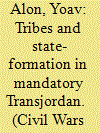

|
|
|
|
|
| Publication |
2006.
|
| Summary/Abstract |
Since its establishment the Hashemite Dynasty in Jordan has enjoyed the support of the Jordanian tribes. In a unique historical process, the tribes were integrated into the modern state structure and developed an interest in the very existence of the state and its regime. Despite the significance of this process, the roots of these exceptional relations between the tribes and state have been insufficiently explored. This article evaluates the tribes' response to state-formation processes during the formative years of the British mandate when the prospect of violent internal dissent was ever present. Contrary to the accepted scholarly understanding that in the early 1930s the central government already achieved the tribes' absolute surrender, this article shows that the tribes' integration was a long, dynamic process, which began with the formation of the Emirate of Transjordan in 1921 and continued well into the 1940s. The main argument is that even with the consolidation of the government's authority, the government did not achieve full control over the tribes, which remained a powerful force. Whereas the tribes benefited from governmental initiatives and played a role in the process of state-building, they opposed any attempt to constrict their autonomy. Though changed through this process, the tribes succeeded in preserving their influence to a greater degree than hitherto acknowledged in the current literature.
|
|
|
|
|
|
|
|
|
|
|
|
|
|
|
|
|
|
|
|
|